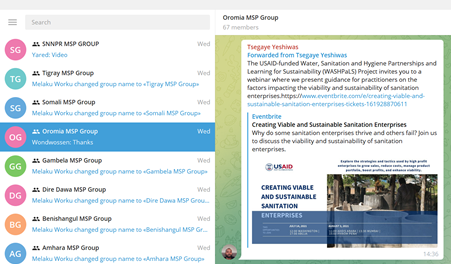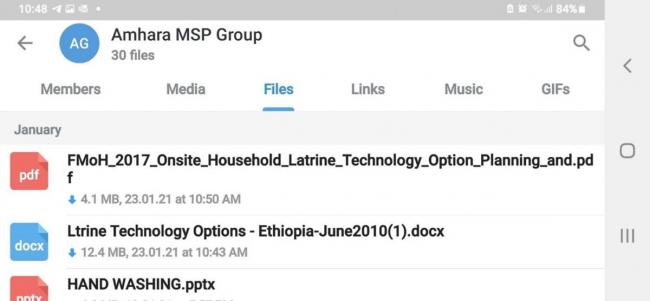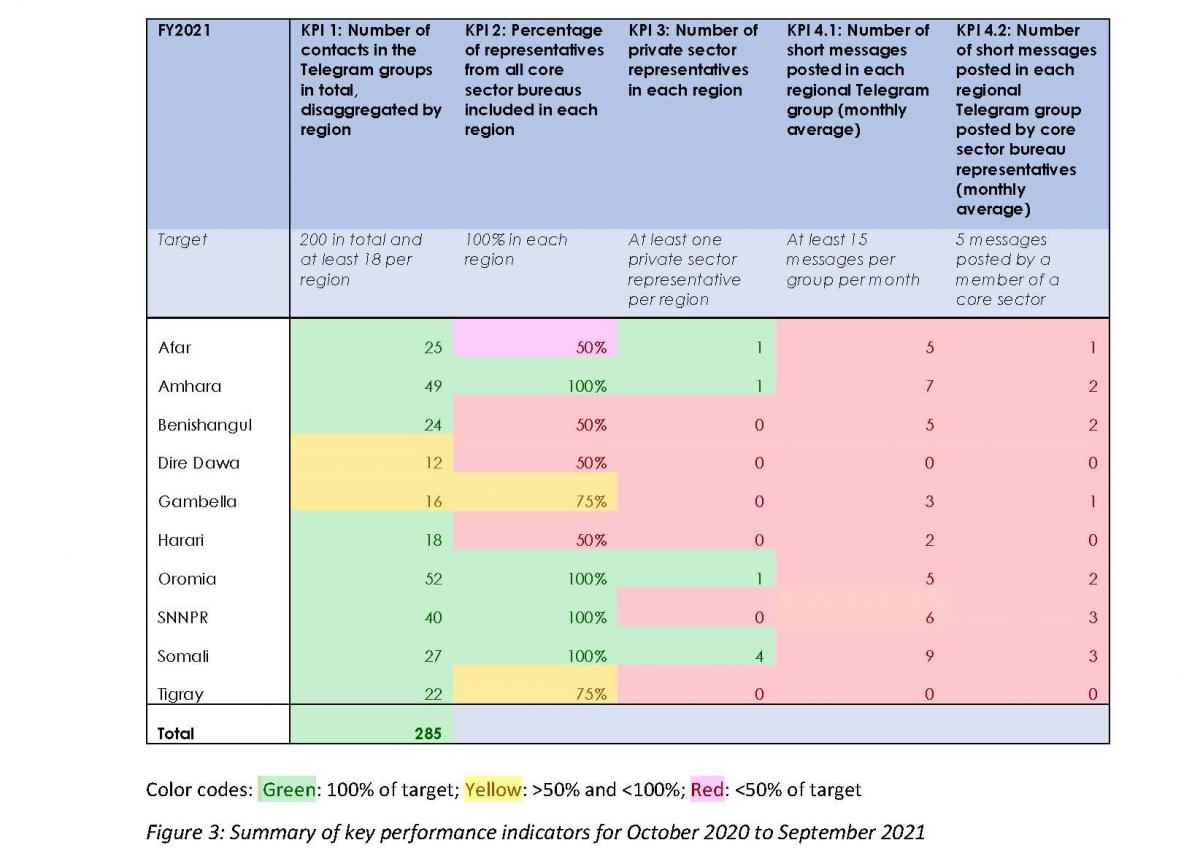Telegram app builds community for sharing in Ethiopia.
Published on: 25/11/2021
This blog was written with the contribution of Melaku Worku
Necessity is the mother of invention, as they say. Covid-19 has scrambled the way we work and connect. As we’ve all experienced, the pandemic forced in-person meetings to go virtual, including our gatherings of people with a particular interest in WASH market development. But more than simply replace meetings, the use of one online tool has enhanced on-going communication and sharing in ways that we hadn’t planned.
The Telegram mobile messaging app is a relatively new communication tool, and it’s been expanding rapidly in Ethiopia as one of the most popular online platforms. So, as pandemic-related restrictions took hold, it made sense for the USAID Transform WASH team to turn to Telegram to help us fulfil one of our primary responsibilities: connect multi-stakeholder platforms (MSPs) at all levels to learning and networking opportunities on market-based sanitation. We started simple, disseminating MSP meeting action points to help members translate their common agendas into action and hold each other accountable.
MSPs are learning alliances led by Ethiopia’s Federal Ministry of Health (MoH) at national and sub-national levels to coordinate market-based sanitation activities, share lessons learned, and exchange ideas with the ultimate aim of identifying and scaling up best practices. Since June 2017, USAID Transform WASH has been supporting the Ministry of Health by taking on the secretariat role for the multi-stakeholder platforms.
When the pandemic hit, our Transform WASH team identified two widely used options for online organisation of remote meetings: Zoom and Telegram. While ministries and development partners mostly used Zoom to organise virtual meetings at the national level, we encountered many challenges in the regions, such as unstable internet connections and frequent power outages. Virtual communication through Telegram, which has lower bandwidth requirements while enabling persistent texting and group functions, was found to be more suitable and reliable.
Even before the Covid-19 outbreak, the MSPs, with Transform WASH facilitation, had been discussing the importance of establishing a social media presence through which members could interact with each other online and improve social accountability in implementing market-based sanitation (MBS). Covid-19 helped us speed this up as physical meetings were officially cancelled.

Example of message shared with the members of the Oromia MSP Group
Altogether, ten Telegram groups have been active since June 2020. T/WASH invited MSP members in 10 regions to join their respective regional group. So far, 285 standing members of MSPs have joined, including many representatives of regional health bureaus (RHBs). Individual members have been given permission to invite and add new members to the app groups, too. While the groups are administered by T/WASH currently, responsibility for ownership and operation will ultimately pass to the RHBs once the Telegram groups are firmly established and running smoothly.
The active participation of MSP members so far has been encouraging with expected room for improvement using such a new forum. Beyond T/WASH consortium partners, participants include representatives of the MoH, RHBs, microfinance institutions (MFIs), technical and vocational education and training institutions (TVETs), and the job creation agencies among government stakeholders. We also see members of NGOs, academia, and the private sector active in the groups. Businesses have found the groups to be a ready audience for introduction of their products to various interested parties.
Telegram has emerged as a great way for platform members to communicate and discuss market-based sanitation (MBS) ideas online. Group members share text messages, photos, and documents, such as research findings and action plans. Despite our early success using the platform, many groups were not engaging at the levels that we had hoped to see. To address this challenge, we created more appealing content, such as pop quizzes to pique members’ curiosity, test their knowledge, and keep them active and engaged. The quizzes promoted friendly competition and interaction with important related policies, like the MoH’s MBS implementation guideline. Quiz respondents were rewarded with free internet credit to make the quizzes even more motivating and fun.
Several functions evolved from the Telegram groups, some even beyond what we originally envisioned:
Communication about MBS
Documentation
Career opportunities (various links to web sites on MBS)
Through the Telegram groups, members also gain easy access to contact information of other members, such as mobile numbers, which helps them reach out directly when needed. This could ultimately contribute toward more productive relationships among MSP members and more coordinated MBS action. Overall, they could play an important role in improving the status of sanitation in the country.

Shared files and media can be accessed easily in Telegram
To track the extent to which the Telegram groups are being used, we collect information on a few key indicators on a quarterly basis, as presented in the table below (October 2020 to September 2021):

The Telegram groups allow the MoH and other stakeholders to reach out to 285 professionals throughout the country who are engaged in MBS activities. In four regions (Amhara, Oromia, SNNPR and Somali) all four core sector offices are represented, although in other regions we need to encourage more participation from missing sector offices and engage them in the MSPs.
Private sector representatives are also underrepresented, so we plan to be more proactive about bringing them in at both national and regional levels. For small local businesses, access to Telegram remains a challenge due to the absence of smartphones and reliable internet connections.
As I mentioned earlier, the active participation of MSP members so far has been encouraging. But, as always, there’s room for improvement. Over the last year, one message was posted, on average, in every group per week – still some way to go to reach our target of one message every other day.
Please join the MSP Telegram group of your interest! The groups can be accessed by anyone interested following the links below:

At IRC we have strong opinions and we value honest and frank discussion, so you won't be surprised to hear that not all the opinions on this site represent our official policy.